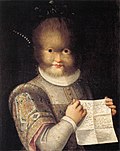Top Qs
Timeline
Chat
Perspective
Petrus Gonsalvus
16th century man known for hypertrichosis From Wikipedia, the free encyclopedia
Remove ads
Petrus Gonsalvus (Spanish: Pedro González; c. 1537, Tenerife – c. 1618, Capodimonte) was a gentleman in the court of Henry II of France.
Referred to by Ulisse Aldrovandi as "the man of the woods",[1] he was notable for his unusual hairiness, which attracted attention throughout his life (and beyond, especially as most of his children inherited his condition). This interest came both from doctors — being considered the first definitely recorded case of hypertrichosis (at least in Europe) — as well as from society at large (including high society, where he spent much time), with him acquiring such nicknames as the "wild gentleman of Tenerife" (Spanish: salvaje gentilhombre de Tenerife) and the "Canarian werewolf" (hombre lobo canario). His life at various courts in France and Italy has been well chronicled.
Remove ads
Biography
Summarize
Perspective
Gonsalvus was born on May 9th, 1537 in Tenerife, shortly after the conquest of the island by Alonso Fernández de Lugo. Of Guanche heritage, he was deemed worthy of the Don honorific later in his life on account of his supposed parental descent from the menceys of Tenerife.[2]
Gonsalvus first came to the court of Henry II, King of France in 1547 at the age of around 10, and was sent there as a gift from the court of Margaret of Parma, regent of the Netherlands.[2] He married while there; the name of his wife remains unknown, but it is believed she was named Catherine Raffelin[3] and that she may have been a lady-in-waiting to Catherine de' Medici. Later, he was moved into the court of Alexander Farnese, Duke of Parma. Of his six children, only two — Françoise and Enrico — did not have hypertrichosis.[citation needed] The ones who did — such as Antonietta Gonsalvus — were also the subject of attention, including paintings.[4] His family became an object of medical inquiry by Ulisse Aldrovandi among others. Despite living and acting as nobles, Gonsalvus and his hairy children were not considered fully human in the eyes of their contemporaries and were gifted, like their father was, to other nobles as a sort of court pet. Gonsalvus eventually settled in Italy with his wife.
He was listed among those who had attended his grandson's christening in 1617. He died on October 15th, 1618 in Capodimonte. He was 81 years old.[citation needed]
Remove ads
Chamber of Art and Curiosities, Ambras Castle
The Chamber of Art and Curiosities, Ambras Castle collection in Innsbruck, Austria has a painting of Pedro González (Petrus Gonsalvus) as well as other people who display an extreme form of hirsutism, also called Ambras syndrome or hypertrichosis in 1933 in reference to its depiction at this collection.[5]
- Petrus Gonsalvus and his wife Catherine by Joris Hoefnagel
- Children of Petrus Gonsalvus by Joris Hoefnagel
- Madelene Gonsalvas portrait, 1580, Ambras collection
- Henry Gonsalvas, Ambras Collection
- Agostino Carracci. Hairy Harry, Mad Peter and Tiny Amon. 1598. Capodimonte
Remove ads
Legacy

It is believed the marriage between Petrus Gonsalvus and Lady Catherine may have partially inspired the fairy tale Beauty and the Beast.[6][7]
References
External links
Wikiwand - on
Seamless Wikipedia browsing. On steroids.
Remove ads







